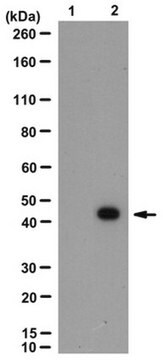M3807
Anti-MAP Kinase, Non-Phosphorylated ERK antibody, Mouse monoclonal
clone ERK-NP2, purified from hybridoma cell culture
Sinónimos:
Anti-ERK, Anti-ERK-2, Anti-ERK2, Anti-ERT1, Anti-MAPK2, Anti-NS13, Anti-P42MAPK, Anti-PRKM1, Anti-PRKM2, Anti-p38, Anti-p40, Anti-p41, Anti-p41mapk, Anti-p42-MAPK
About This Item
Productos recomendados
biological source
mouse
Quality Level
conjugate
unconjugated
antibody form
purified from hybridoma cell culture
antibody product type
primary antibodies
clone
ERK-NP2, monoclonal
form
buffered aqueous solution
mol wt
antigen, ERK-1 44 kDa
antigen, ERK-2 42 kDa
species reactivity
human, rat
concentration
~2 mg/mL
technique(s)
immunocytochemistry: suitable
indirect ELISA: suitable
microarray: suitable
western blot: 5-25 μg/mL using rat brain extract
isotype
IgG1
UniProt accession no.
shipped in
dry ice
storage temp.
−20°C
target post-translational modification
unmodified
Gene Information
human ... MAPK1(5594) , MAPK3(5595)
rat ... Mapk1(116590) , Mapk3(50689)
General description
Specificity
Immunogen
Application
Physical form
Preparation Note
Disclaimer
¿No encuentra el producto adecuado?
Pruebe nuestro Herramienta de selección de productos.
Storage Class
10 - Combustible liquids
wgk_germany
nwg
flash_point_f
Not applicable
flash_point_c
Not applicable
Certificados de análisis (COA)
Busque Certificados de análisis (COA) introduciendo el número de lote del producto. Los números de lote se encuentran en la etiqueta del producto después de las palabras «Lot» o «Batch»
¿Ya tiene este producto?
Encuentre la documentación para los productos que ha comprado recientemente en la Biblioteca de documentos.
Nuestro equipo de científicos tiene experiencia en todas las áreas de investigación: Ciencias de la vida, Ciencia de los materiales, Síntesis química, Cromatografía, Analítica y muchas otras.
Póngase en contacto con el Servicio técnico








